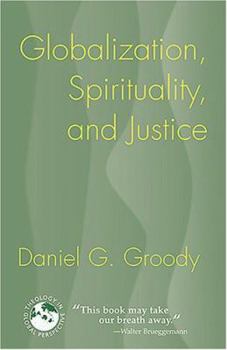Globalization, Spirituality, and Justice: Navigating the Path to Peace
(Part of the THEOLOGY IN GLOBAL PERSPECTIVE Series)
Select Format
Select Condition 
Book Overview
This revised edition of the popular classroom text offers a theological reading of globalization and a global reading of theology. This description may be from another edition of this product.
Format:Paperback
Language:English
ISBN:1570756961
ISBN13:9781570756962
Release Date:May 2007
Publisher:Orbis Books
Length:280 Pages
Weight:0.95 lbs.
Dimensions:0.7" x 6.1" x 9.2"
Customer Reviews
3 ratings
Groody's great
Published by Thriftbooks.com User , 15 years ago
I used his chapter on liberation theology to explain the concept to my high school class, it was so succinct.
Excellent!
Published by Thriftbooks.com User , 16 years ago
Truly excellent work. This book addresses how to be christian in todays world. Thought provoking and very well researched. Great for a book group with discussion questions at the end of each chapter. I have already recommended this book to many.
This Book May Take Our Breath Away
Published by Thriftbooks.com User , 17 years ago
"This book may take our breath away." So states the cover blurb from Walter Brueggemann on "Globalization, Spirituality, and Justice: Navigating the Path to Peace," released on April 17, 2007 by Daniel G. Groody. The basic premise is, metaphorically, that the global family has booked passage and is now aboard the ship of globalization and there is no turning back to the shore. The question we must ask ourselves, as passengers on this ship, is, "who is at the helm and where are we going?" As Gustavo Gutierrez quips, "Being against globalization is like being against electricity." We can't stop the ship, and one would question the wisdom of wanting to, but the issues of who's driving and where will we end up are legitimate. The book begins by offering an overview of the dual nature of globalization--its inherent propensity for good, such as the triumphs of technology, and for ill, such as the tragedy of poverty. Perhaps more importantly, chapter one details where we have sailed on this ship so far. This chapter seeks to give a realistic picture of the world today and paints that picture by using the most current statistics available. These statistics were gathered from sources such as the World Bank, the United Nations annual Human Development and World Development reports, and the World Institute for Development Economic Research. It is staggering to learn that 19 percent of the global population lives on less than $1 per day, 48 percent live on less than $2 per day, 75 percent live on less than $10 per day, and, according to the World Bank, two-thirds of the population of the planet lives in poverty. The weight of these income disparities is compounded when one looks at the unequal distribution of wealth and our disordered spending patterns. According to an article in the December 2006 issue of "The Economist," half of all wealth is held by only 2 percent of the world's adults. The world spends almost as much money on toys and games as the poorest 20 percent of the population earns in a year, and four times as much on alcohol as on international development aid. The troubling area of military spending is also addressed. The world picture, from the perspective of poverty and need is indeed bleak, but Professor Groody does not leave us in the grip of its reality with no hope. He is convinced that, while fully aware of the abuses committed in the name of religion throughout history, the gift theology can bring to the process of globalization is a navigation system that has the potential to guide us to a place of solidarity and peace, where if globalization is left to itself or to those leaders who are only motivated by profit we may run aground on the icebergs of greed. As Groody notes, we are doing theological reflection all the time, but he argues that to find a place of human solidarity we must undergo a conversion from "money-theism" to monotheism. The remaining eight chapters of the book deal with how the various sub-disciplin





